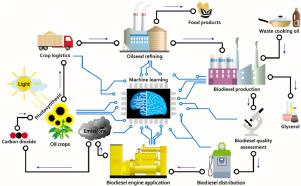Progress in Energy and Combustion Science ( IF 29.5 ) Pub Date : 2021-03-13 , DOI: 10.1016/j.pecs.2021.100904 Mortaza Aghbashlo , Wanxi Peng , Meisam Tabatabaei , Soteris A. Kalogirou , Salman Soltanian , Homa Hosseinzadeh-Bandbafha , Omid Mahian , Su Shiung Lam

|
Biodiesel has the potential to significantly contribute to making transportation fuels more sustainable. Due to the complexity and nonlinearity of processes for biodiesel production and use, fast and accurate modeling tools are required for their design, optimization, monitoring, and control. Data-driven machine learning (ML) techniques have demonstrated superior predictive capability compared to conventional methods for modeling such highly complex processes. Among the available ML techniques, the artificial neural network (ANN) technology is the most widely used approach in biodiesel research. The ANN approach is a computational learning method that mimics the human brain's neurological processing ability to map input-output relationships of ill-defined systems. Given its high generalization capacity, ANN has gained popularity in dealing with complex nonlinear real-world engineering and scientific problems. This paper is devoted to thoroughly reviewing and critically discussing various ML technology applications, with a particular focus on ANN, to solve function approximation, optimization, monitoring, and control problems in biodiesel research. Moreover, the advantages and disadvantages of using ML technology in biodiesel research are highlighted to direct future R&D efforts in this domain. ML technology has generally been used in biodiesel research for modeling (trans)esterification processes, physico-chemical characteristics of biodiesel, and biodiesel-fueled internal combustion engines. The primary purpose of introducing ML technology to the biodiesel industry has been to monitor and control biodiesel systems in real-time; however, these issues have rarely been explored in the literature. Therefore, future studies appear to be directed towards the use of ML techniques for real-time process monitoring and control of biodiesel systems to enhance production efficiency, economic viability, and environmental sustainability.
中文翻译:

生物柴油研究中的机器学习技术:综述
生物柴油具有极大的潜力,可以使运输燃料更具可持续性。由于生物柴油生产和使用过程的复杂性和非线性,因此需要快速,准确的建模工具进行设计,优化,监控和控制。与建模此类高度复杂过程的常规方法相比,数据驱动的机器学习(ML)技术已展现出卓越的预测能力。在可用的ML技术中,人工神经网络(ANN)技术是生物柴油研究中使用最广泛的方法。人工神经网络方法是一种计算学习方法,它模仿人脑的神经处理能力,以映射定义不明确的系统的输入-输出关系。鉴于其高泛化能力,在处理复杂的非线性现实世界工程和科学问题方面,人工神经网络已变得越来越流行。本文致力于彻底审查和批判性讨论各种ML技术应用,尤其是ANN,以解决生物柴油研究中的函数逼近,优化,监控和控制问题。此外,突出了在生物柴油研究中使用ML技术的优缺点,以指导未来在该领域的研发工作。ML技术通常用于生物柴油研究中,以建模(酯交换)酯化过程,生物柴油的理化特性以及生物柴油为燃料的内燃机。将ML技术引入生物柴油行业的主要目的是实时监视和控制生物柴油系统。然而,这些问题很少在文献中探讨。因此,未来的研究似乎旨在将ML技术用于生物柴油系统的实时过程监控和控制,以提高生产效率,经济可行性和环境可持续性。



























 京公网安备 11010802027423号
京公网安备 11010802027423号